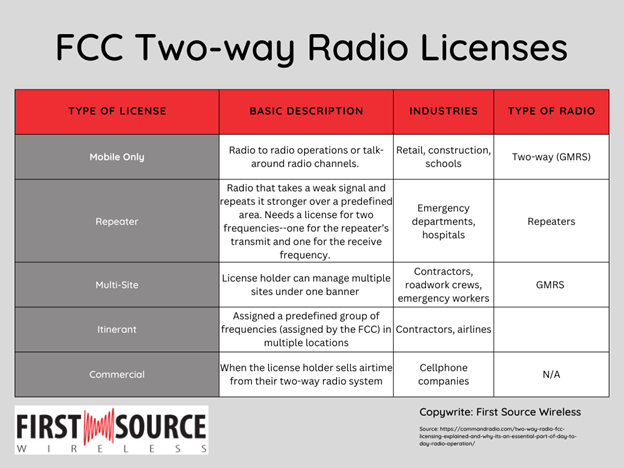The Federal Communications Commission was founded in 1934 to replace the Radio Act. The organization was originally formed to monitor and grow telephone, telegraph, and radio communications. Today, this has expanded to include satellite and cable communications.
In this article, we will discuss:
- What the FCC does
- Why FCC licenses are necessary
- Why you should not avoid an FCC license
- Types of licenses available
- The cost of an FCC license
- How we can help you
- Link to apply for a license
We hope our information and input help your business learn more about the Federal Communications Commissions’ role in the communication industry, why a license is necessary for certain radio operations, and how to apply for a license.
What does the FCC do?
The FCC or the Federal Communications Commission’s job is to “regulate interstate and international communications by radio, television, wire, satellite, and cable in all 50 states, the District of Columbia and U.S. territories”.
The Federal Communications Commission does more than just regulate communications. They also promote innovation and investment in broadband services. As the organization that monitors the use and abilities of the spectrum, they encourage the highest and best use of the spectrum domestically and internationally.
The FCC wants to ensure a robust and competitive market is thriving in connectivity and communications. However, with a thriving market comes obstacles and problems, and it is the FCC’s job to create rules, enforce laws, and create licenses to maintain order.
The entire premise behind expanding communications is to create more reliable and efficient technology for connecting people. Therefore, with the regulations the Federal Communication Commission provides, reliability and efficiency can progress.
Why do businesses need an FCC license for two-way radios?
Over time, the FCC created licenses for two-way radio users. This happened because the spectrum has limited room. With too many users on one channel or frequency, communication can be interrupted by other radios users, overheard, or completely cut out.
Two-way radios use the shared FRS and GMRS frequencies. FRS stands for family radio services—radios that operate on this frequency do not need an FCC license because they operate at or under 2 watts of power.
GMRS or general mobile radio service two-way radios operate above 2 watts of power. When operating at this level, the FCC requires a license because the spectrum becomes smaller. The smaller the spectrum, the higher the possibility of overlap in communication. Licenses help businesses get designated frequencies to operate within, so they are guaranteed consistent communication.
Why is operating your two-way radio without a license not recommended?
The first rule of thumb is operating a two-way radio that works through GMRS without a license is illegal. The FCC has the power to not only impose very high and costly fines on your business, but they can also revoke your business’ ability to use two-way radios.
The Federal Communications Commission can heavily impact anyone using the different communication spectrums like radio (FM/AM), two-way radios, newscasters, and more. For instance, there have been discussions about the FCC shutting down or implementing fines/penalties on News Corp—a prominent newscaster—for unethical conduct.
Moreover, your business may experience higher rates of interference or overlap in communication. A license that is less than $100 and lasts for 10 years is much more budget friendly than hundreds of thousands of dollars in fines.
Types of licenses available:
There are several types of licenses the FCC offers to comply with their rules. Below is a chart outlining the different licenses available to begin your process of determining which category your business may fall under.

What is the cost to get an FCC License?
Getting a Federal Communications Commission license is not as costly as it is if your business is caught using GMRS radios without a license. To get any FCC license to operate a two-way radio, it will cost you or your business an average of $70.00 and the license will last 10 years.
Some government organizations may be exempt from this payment, so if you are a government entity, contact the FCC before making a payment.
Moreover, it is important that any business or organization renews their license within 90 days before the expiration date. This way, you do not need to fill out a new application. By taking early action, you also avoid not being able to use your radios while waiting for the new license.
How can we help you?
Getting an FCC license is a straightforward process. Below is a checklist you can refer to determine if you have reached all the necessary steps.

Image from: https://firstsourcewireless.com/blogs/blog/a-quick-guide-getting-your-two-way-radio-fcc-license
To begin the process of obtaining your Federal Communications Commission two-way radio operation license, go here.
Conclusion:
Getting a Federal Communications Commission two-way radio license is very important for your business and maintaining proper two-way radio communications. If you operate on over 2 watts of power for your two-way radios, an FCC license is required.
By investing in this license, you are protecting your business from potential legal fees, FCC penalty fees that can total into the hundreds of thousands, and have a higher guarantee of private communication.
We hope this article gave you the necessary information to learn how to get an FCC license and why it is important. If you have any questions about the information above, please feel free to reach out to us at First Source Wireless.
Go here to learn more: https://firstsourcewireless.com/collections/fcc-licensing-services
Works Cited:
https://www.nbcnews.com/media/fcc-rupert-murdoch-fox-news-rcna74187
https://www.fcc.gov/about-fcc/what-we-do
https://firstsourcewireless.com/blogs/blog/a-quick-guide-getting-your-two-way-radio-fcc-license
https://www.chicomm.com/blog/why-do-i-need-an-fcc-license-for-my-two-way-radio
https://techwholesale.com/fcclicense.html
https://www.rcscommunications.com/rcs-quick-guide-fcc-license-for-two-way-radios
https://www.britannica.com/topic/Federal-Communications-Commission

